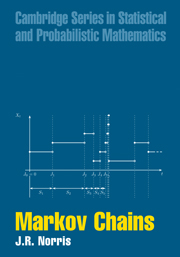Preface
Published online by Cambridge University Press: 05 June 2012
Summary
Markov chains are the simplest mathematical models for random phenomena evolving in time. Their simple structure makes it possible to say a great deal about their behaviour. At the same time, the class of Markov chains is rich enough to serve in many applications. This makes Markov chains the first and most important examples of random processes. Indeed, the whole of the mathematical study of random processes can be regarded as a generalization in one way or another of the theory of Markov chains.
This book is an account of the elementary theory of Markov chains, with applications. It was conceived as a text for advanced undergraduates or master's level students, and is developed from a course taught to undergraduates for several years. There are no strict prerequisites but it is envisaged that the reader will have taken a course in elementary probability. In particular, measure theory is not a prerequisite.
The first half of the book is based on lecture notes for the undergraduate course. Illustrative examples introduce many of the key ideas. Careful proofs are given throughout. There is a selection of exercises, which forms the basis of classwork done by the students, and which has been tested over several years. Chapter 1 deals with the theory of discrete-time Markov chains, and is the basis of all that follows. You must begin here. The material is quite straightforward and the ideas introduced permeate the whole book.
- Type
- Chapter
- Information
- Markov Chains , pp. ix - xiiPublisher: Cambridge University PressPrint publication year: 1997



